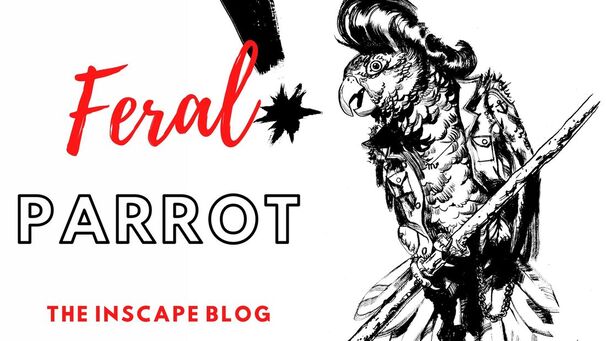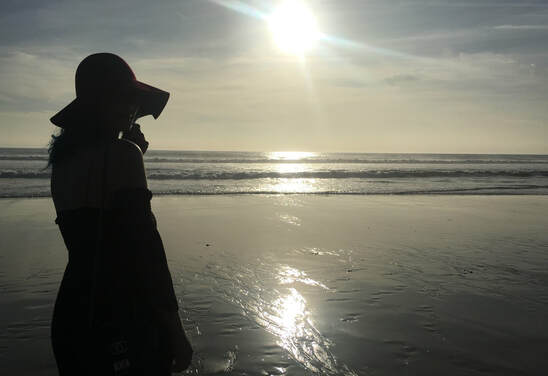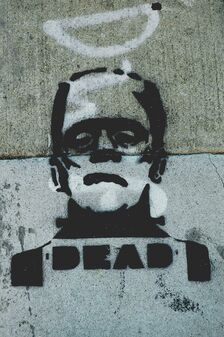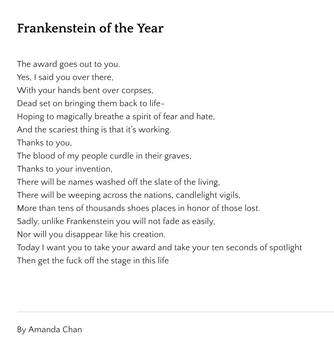- Folio No. 9
- About
- Feral Parrot : The Blog
- INTERVIEWS
- SUBMISSIONS
-
ISSUE ARCHIVE
- PRINT Chapbook No.6 Healing Arts
- Online Issue No.9
- Online Issue No.1 Fall 2016
- Online Issue No.2 Spring 2017
- ONLINE Issue No.3 Fall 2017
- PRINT Vol 72 No 2 Fall 2017
- PRINT Vol 73 No.1 Fall 2018
- ONLINE Issue No. 4 Fall 2018
- Online Issue No.5 Summer 2018
- FOLIO No.1 Fall 2018 VOTE
- ONLINE Issue No.6 Fall 2018 Fall Spirituality
- FOLIO 2 Fall 2019 Celebrating Dia De Los Muertos
- FOLIO No.3 -- Moon Moon Spring 2019
- FOLIO No.4 Celebrating New PCC Writers
- FOLIO No.5 City of Redemption
- FOLIO No.6 Spring 2020
- FOLIO No. 7 - Winter 2021 Into the Forest
- 2022 Handley Awards
- Inscape Alumni Board
- PRINT Chapbook No. 7 Healing Arts
- Blog
- Untitled
Written by Cassie WilsonI was 16 years old the first time I was discriminated against for being a woman. I can still remember the black and white flannel shirt that clung to my sides, the taste of cafe con leche that lingered on my lips and the knife like tears that cut my face as I lay my head against my dad’s baby blue Chevy truck. I had spent the prior 6 months studying, reviewing and practicing for my driving exam. I was a bushel of hope, excitement and a little anxiety the morning of my appointment. I reminisced of the past summer and how many mini road trips I spent with my father driving 5 hours up to Fresno only having my learners permit. I had kicked ass on those drives, my dad guiding me every step of the way until I learned the in’s and out’s of that truck. I knew what I was doing, but as my driving exam begun I could hear every scribble my examiner jotted down on his grading sheet. Anxiety surged through my veins, my hands became sweaty and my breath shaky. As I pulled back into the parking lot of the Glendale DMV, my driving exam had concluded. I was so nervous to hear my results. I peered out the back window where my dad sat eager to hear the news. My instructor then handed me my driving test sheet. It was marked up with blue ink for mistakes I was sure I did not do. His only words before he exited, “Next time bring a different car, a girl like you can’t handle a truck like this.” This experience began to shape me into the fierce, independent woman I today. As I sit here and ponder over the experiences that awoke that woman within me, I think of Kate Chopin’s book, “The Awakening”. A feminist manifesto that demands to be read with every seductive image, symbol, motif and archetype. Eloquently written, Chopin describes Edna, Louisiana Creole woman, trapped within the confines of a 19th century traditional society. The journey of her awakening, her rebirth into her own fierce and independent woman, is far from easy. She is surrounded by the traditional expectations of a women, her verbally abusive husband and her own self-illusions of life. In order for change to occur, it must succeed the awakening. For me, being a college student can be daunting, I am constantly piled with what seems like endless amounts of work, while also contemplating my very existence in this world. So when I was assigned this book, I was struck with both: awakening and work. The difference, I was uncovering parts of my soul as I decoded figurative language, recognized important symbols and uncovered themes from text. I was growing, as I was learning, without even realizing it. In chapter 3 as Edna’s husband, Mr. Potellier arrives home drunk with wine and excitement, his verbal abuse begins. He stumbles in, waking Edna from slumber, gaudily describing his merriments from the night. Edna is unmoved, unable to relate or care for his nights festivities. He begins his illusion of care by stepping into their children’s room to check if they are sleeping soundly and discovers that one of their boys has fallen "ill" with fever. Edna is positive the boy is fine, but her husband is insistent for her to check. I can feel Edna’s annoyance arise, while Chopin ironically describes Mr. Pontellier’s own annoyance, “He reproached his wife with her inattention, her habitual neglect of the children. If it was not a mother’s place to look after children, whose on earth was it?”(Chopin 6). The dramatic irony of the text is evident. Mr. Potellier is completely capable to care for his children, as any father should, yet he forces his wife to do it. The expectations of Edna become clear - remain silent, stagnant, obey and don’t question. Her voice didn't matter in comparison to her husbands. When Edna returns after assuring her children are fine, just as she'd expected, she is received by her fast asleep husband. She is overcome with an overwhelming and deep sadness. She begins to weep as Chopin describes, “The mosquitoes made merry over her, biting her firm, round arms and nipping at her bare insteps. The little stinging, buzzing imps succeeded in dispelling a mood which might have held her there in the darkness half a night longer (Chopin 7). The mosquitoes serve as a symbol of her husband, he stings, buzzes and nips at Edna in their late night encounter. I’m burning with anger as I read, remembering my own experience remaining silent, still, stagnant in my father’s baby blue chevy truck. After hearing my examiner's comment, I did not look up from my lap. I did not reply. I did not even acknowledge him as he left the car. I tilted my head to the left to rest on the car window, as the tears rushed down my face. I knew I had not made any driving errors and I knew how to handle that truck. I had merged in and out of lanes on the 5 freeway, made endless left turns at intersections and abided by every speed limit on those 5 hour mini road trips to Fresno. I was never pulled over, I was never honked at and my dad rarely corrected me. Yet when my examiner nipped, bit, and stung at my integrity, my ability, and my intelligence - I remained motionless. Edna and I both were blind - not to our intelligence - but to our worth when attacked by a masculine voice of authority. Throughout the novel Edna befriends a woman named Adele Ratignolle. She is an archetype representing the embodiment of what a women “should” be. Delicate. Dainty. Graceful. So beautiful that everyone in their society noticed her for it, yet always in need for help because of her fragileness. Adele was a “mother-woman” - constantly pregnant. Chopin details her idolizing her children, her role as a mother, and her husband(8). She is the perfectly traditional household woman. Edna was the opposite, possessing strong sturdy hands, unlike Mrs. Ratignolle’s dainty fingers. Edna was capable of enduring the sun, while Adele needed to be shielded by garments constantly when at the beach. Edna and Adele disagreed - but they remained close friends, Adele serving as Edna’s first influence of her awakening. When the two women enjoy a day at the beach - their differences come to surface. Edna doesn’t wish to be like Adele, she is comfortable with herself and pities Adele’s life. The sea surrounds them and with this realization Edna is drawn into the ocean’s seductive allure. Edna is not the “typical” household woman - she seeks freedom, adventure, love, and life. Chopin highlights their differences purposefully, exemplifying Edna’s free nature and lack of traditionalism. She represents the REAL thoughts, emotions, and discriminations that women in the 19th century endured. She represents the oppression, the restrictions, the responsibilities, and the lack of voice that existed for these women - that still exist today. Just as Edna realized her and Adele’s differences, I realized my worth vs. my expectations. My examiner questioned my ability to drive my father’s 4 door baby blue Chevy truck. He expected me to be delicate, dainty and fragile. Throughout our drive he marked me down continuously for mistakes I knew I wasn’t making. His expectations overpowered my ability. I have strong, sturdy hands able to grip the wheel of my fathers truck. Able to control the car’s movement and power. My legs and feet are tough and powerful, able to push down on the acceleration and brake. My mind intelligent, radiant, and gleaming of knowledge. My ability to drive that truck was apparent, I glided throughout the Glendale streets with fierce ease and gentle power. Although none of this mattered, the only thing that mattered was my examiners opinion and expectation of me. If he said I wasn’t good enough, then I became just that - not enough. Throughout the novel water is an important recurring symbol, constantly drawing Edna into the depth and freedom the ocean represents. At first she is unable to swim, blind to free will and independent choice. As the novel continues, Edna learns to swim, and with her first dip into the ocean, her awakening begins. She recognizes herself as a human being with the capacity for more than just household chores and child care. As Edna swims out in the water against the current, she realizes her worth. She is enlightened, curious, excited, confused, and overwhelmed with realization. This continuous realization is accompanied by vivid descriptions of the sea throughout Chopin’s book until Edna eventually becomes completely aware of her self-worth. In the last paragraph Edna describes to her Doctor before going for her final swim, “I am not going to be forced into doing things … I want to be left alone. Nobody has a right .. one might go on dreaming - but to wake up… it is better to wake up …, even to suffer, rather than to remain a dupe to illusion all one’s life”(92). This is the boiling point, her final awakening. Edna refuses to be like Adele: fragile, delicate, and dainty. She refuses to let the mosquitoes of her husband’s abuse, nip and bite her strong arms any longer. She refuses to let anybody, ever again, tell her what to do, how to act and who to be. She becomes her own woman throughout her own journey, she will not be the same wife or the same mother. She is reborn as she walks out into the moonlit ocean and completely surrenders to her freedom, willingly drowning in the ocean. As I sit here today, completely reborn myself, I am no longer still, stagnant, motionless. I returned for my drivers test the following month in the same baby blue Chevy truck. The days before my next appointment I spent contemplating and questioning, just as Edna did, until I finally decided I had to do something about it. I refused to be a victim of expectation. I drove with confidence through the vibrant Glendale streets, I made my ability apparent. Every turn I made with a fierce elegance that shivered up my spine and out of my mouth. I spoke up - telling my new examiner my previous experience and that I would not tolerate that type of discrimination again. My voice mattered, it was fierce, loud, and powerful. As I continued to grow up I never let my voice be dim and puny again. I lead my own life without expectation of others. I had reached my ocean. I was enough. This book is reminded me of my evolution - I grew as Edna grew. I found myself in Chopin's text, while learning and engaging. The Awakening is social change - it influences women and men to speak up, stand their ground and never let themselves fall victim to the expectations of society or others. It promotes change with the challenges, the struggles and the rebellion of Edna Pontellier. I urge you, your peers, friends, students, parents, coworkers and anyone who is willing, to please read it. It will plant the seeds to your own awakening. This is the now, this is our generation, this is our time. Stay Woke and do something about it. Cassie Wilson is a student at Pasadena City majoring in English. She is a Creative Nonfiction Writer and enjoys weaving analysis of literature or poetry into her personal life. She says, her favorite thing to do before she writes is sit down with some coffee and play instrumental pop music.
0 Comments
Written by Andrew ZapataAre we all just naturally hateful? Or is the sense of hate instilled in us by someone or something? Throughout history various dictatorships have been held around the world - each one leaving its people robbed, broken, and resentful. Hate and fear are inspired to take the place of kindness or love, creating a bleak and deserted void in it's wake. The poem, "Frankenstein of the Year" by Amanda Chan, touches a thematic resemblance to tyranny. Chan alludes to a monster creating a monster - relating back to the original story of Frankenstein. Chan uses Dr. Frankenstein and his monster to illustrate her struggle of loss in the face of an evil maniacal villain. The award goes out to you./ With your hands bent over corpses, Dead set on bringing them back to life- Hoping to magically breathe a spirit of fear and hate, She expresses hate towards someone she alludes to being the embodiment of horror; full of animosity, pushing the brink of destructive mayhem. Chan illustrates Dr. Frankenstein "hoping to magically breathe a spirit of fear and hate" into his creation. This creation mimes the idea of an oppressor trying to recreate their own version of an individual. The process of such a creation sometimes results in death, as Chan darkly describes "with your hands bent over corpses". A diabolic fiend -- trying unnaturally to mold individuals. This allusion metaphorically represents how oppressors or discriminators or even dictators attempt to reinvent or define individuals of a specific culture, race, or religion. The Holocaust being a prime example of this. Chan continues to describe: The blood of my people curdle in their graves, Thanks to your invention, There will be names washed off the slate of the living, There will be weeping across the nations, candlelight vigils, More than tens of thousands shoes places in honor of those lost. The tone of the poem is shifted into grief and devastation as Chan expresses her personal loss, pain, and suffering felt over the deaths of her people. The mass murder illustrated in the poem is described when Chan states, "The blood of my people curdle in their graves". The metaphoric insinuation of Dr. Frankenstein's monster represents the loss of Chan's people in the face of a vile individual. This murder is a product of the decomposition of personal identity. Animosity is felt in the souls left living with this loss. Chan feels this resent as she expresses: Sadly, unlike Frankenstein you will not fade as easily, Nor will you disappear like his creation. Today I want you to take your award and take your ten seconds of spotlight Then get the fuck off the stage in this life Chan closes the poem referring back to her original Frankenstein allusion. Setting a tone for anger and malevolence as she expresses her resent that this oppressor can not be diminished, unlike the doctor and his soulless mutant. She compares her oppressor to Dr. Frankenstein and his perverse creation. She explains, "unlike Frankenstein you will not fade as easily". Despots, like Hitler, often don't fade away until after their carnage. They receive a lot of public attention and approval by individuals who support their reign. Chan describes this when she states, "I want you to take your award and take your ... spotlight then get the fuck off the stage". During Hitlers dictatorship he received mass amounts public praise and approval. He was loved and even celebrated. This example parallels to Chan's expression of loathsome to her oppressor's "spotlight" to the public. She is passionately angry and desperately wants this person to get off the stage. Perhaps this planet is doomed to a cycle of enmity - influenced by oppressors or discriminators or even dictators. Society can be easily manipulated - striping individuality and personality from cultures, religions, and races. Tyranny that reigns throughout society not only robs personal identity from individuals, but is also capable of massacres in the process. Leaving the surviving individuals hateful and fearsome. Dr. Frankenstein and his monster represents this cycle in Amanda Chan's poem, "Frankenstein of the Year". In order to heal and prevent this sequence throughout society - we must promote love, acceptance, and individuality over all else. Andrew Zapata is a current student at Pasadena City College, transferring next year to Cal State LA. His current major is English and he hopes to become a Humanities professor in the future.
|
IMPORTANT NOTE:
PCC Inscape Magazine, housed at Pasadena City College, is following Coronavirus protocols. At this time our staff continues to read submissions and publish web content. Note:
Blog Posts reflect the opinions of the writer and not the opinions of Pasadena City College or Inscape Magazine Editorial Staff Members. Archives
December 2023
Categories
All
|





 RSS Feed
RSS Feed